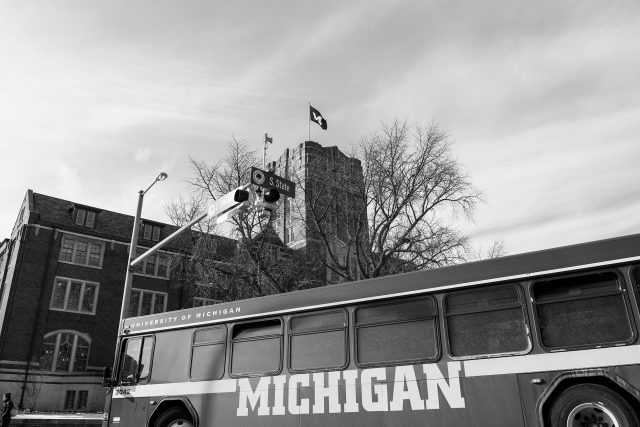[ad_1]
It’s been an unusual several months for Central Student Government. In March, the SHUT IT DOWN party ran on the platform of halting all CSG operations until the University of Michigan divests from companies profiting off Israel’s military campaign in Gaza. They subsequently won both the presidency and vice presidency in the spring election, although they narrowly fell short of a majority in the Student Assembly.
Since then, CSG President Alifa Chowdhury has made good on her party’s promise of disruption. She has vetoed the body’s spring, summer and, as of this past Thursday, fall budgets. As it stands, the vote to override the fall budget veto will take place this Tuesday and if it doesn’t pass, CSG will essentially be nonfunctional. Students deserve, and need, more from their student government.
CSG operates using student funds. The money for the budget comes from a mandatory $11.19 fee included in students’ tuition each semester. In the past, this has been a worthwhile investment. CSG, being composed of students, is well-suited to identify and remedy the concerns faced by its constituents.
Many of the campus programs students have come to love — the low-cost AirBus shuttles to and from the airport, special events that make freshmen feel at home and the invaluable funding for student organizations — all come from CSG money and efforts. With the budget now in limbo, all of these programs are unrealizable.
Upward of $600,000 in CSG fees was collected this semester, which student groups can’t access until the current impasse is resolved. Anti-SHUT IT DOWN members of CSG leadership seeking a temporary solution asked the University to step in to meet the funding need. The University agreed to meet the request, blunting the most severe consequences of SHUT IT DOWN’s victory, but the situation is not ideal for campus.
In an interview with The Michigan Daily, Mario Thaqi, speaker of the 14th CSG Assembly, explained the trade-off.
“We’re weighing two separate things here,” Thaqi said. “We’re weighing our sovereignty as a government, and then we’re weighing the needs of the students.”
In order to meet those needs, Thaqi and aligned members of the Assembly — none of whom are members of SHUT IT DOWN — chose to give up some of the government’s autonomy in exchange for temporary funding. Given the circumstances, this was a good decision. The long-term consequences of a defanged CSG, however, won’t be good.
When the CSG is functioning, students have the power to solve their own problems. When students felt the cost of New York Times subscriptions and Airbus rides weigh on them, students voted to allocate money to subsidize them. When students felt campus community wane, students voted to host events to unify it. And, when students determined that our campus would be more vibrant if student organizations had more funding, students voted to fund them.
Now that CSG is shut down, that power belongs to the University, an entity that — as evidenced by the recent changes to the Statement of Student Rights and Responsibilities — doesn’t always have student interests at heart.
The circumstances which forced student legislators to seek aid from the University were created entirely by SHUT IT DOWN. Its candidates won the executive and veto authority of the most powerful advocacy body on campus and decided to bring its operations to a halt. They call this plan disruption, but this Editorial Board thinks that “dereliction” is a more accurate description.
This Editorial Board chose not to endorse SHUT IT DOWN in the March election. Even then, we feared that their plan, or lack thereof, was unrealistic and counterproductive to the overall wellbeing of campus and also to the very policy goals they aim to achieve.
The party used real and meaningful pro-Palestine sentiment to coast to the highest student office on campus and has done nothing to advance that movement. The resolutions, ballot measures and polling initiatives that allowed students to make their priorities and voices clear to the administration are gone. Before SHUT IT DOWN, students had few avenues beyond the University Board of Regents to make decisions for campus and to make themselves heard. Now they have none.
The party is penalizing students for an issue they have no control over. Yes, it’s opposing the administration, but it’s also opposing the large portion of the student body who benefits from CSG programs and funding — a group it should be trying to win over to its side.
This Editorial Board has, in the past, been critical of CSG’s role on campus. We’ve questioned its effectiveness and the impact of its decisions. But, after witnessing the catastrophic consequences of SHUT IT DOWN’s victory, we have come to the conclusion that CSG’s role in the lives of students is indispensable. The dilemma surrounding the budget has shown the key role that CSG plays in campus life — a role that must be preserved.
Students need a functioning student government, and right now, they don’t have one. As Thaqi said, “We don’t have a government if we don’t have a budget.” The upcoming CSG elections in November are a chance for the student body to reclaim its voice and restore the organization’s ability to act effectively. With interim seats on the ballot and on-the-fence assembly members in office, U-M students need to vote this fall to preserve an Assembly majority that fulfills the integral duties of CSG. And for the assembly members voting on Tuesday: Pass the budget.
This editorial represents the opinion of The Michigan Daily’s Editorial Board. If you are interested in submitting an Op-Ed or Letter to the Editor, please send your submission to tothedaily@michigandaily.com.
Related articles
[ad_2]
Source link











